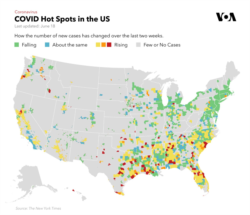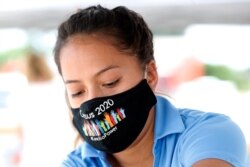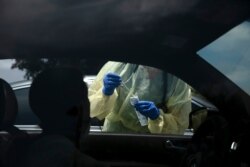The number of new single-day coronavirus infections in the U.S. is near record highs as the government revealed more than 20 million people in the U.S. could have contracted the virus.
The U.S. states reported 39,327 new cases Thursday, according to The Washington Post, the highest one-day total since the outbreak began in December.
Johns Hopkins University recorded 34,300 cases Wednesday, shy of its reported record high of 36,400 on April 24.
Harvard Global Health Institute director Ashish Jha said in an interview Thursday on NBC's "Today" show that the recent increase in U.S. infections was due to the premature reopening of the country's economy while lacking appropriate safety procedures.
Meanwhile, the U.S. Centers for Disease Control and Prevention said Thursday the number of coronavirus cases may be 10 times greater than has been reported.
CDC: 20 million cases
A count by Johns Hopkins University puts the number of cases at 2.5 million. However, the real number of estimated cases is about 20 million, the CDC said.
Officials have long believed the actual number of cases has been underreported.
The CDC says it bases its new estimate after studying blood samples from across the country. It says many cases were not caught because early testing was limited or carried out only on those people who showed symptoms.
The CDC estimates that 6% of the U.S. population has had COVID-19.
Officials report the number of single-day deaths in the U.S. fell last week, but the number of cases appears to be growing.
One-day records
Several states set new one-day records this week – mostly in the South and West. They include Arizona, California, Nevada, Oklahoma and Texas. Other states are also reporting a rise in the number of new cases.
Officials are generally blaming the surge in new cases on young people who they say refuse to wear masks, won't heed calls for social distancing, and are spreading the virus to more vulnerable older adults.
Texas Governor Greg Abbot said Thursday that the state would delay reopening plans to contain surges of new infections. He signed an executive order suspending elective surgeries at hospitals in four counties to guarantee adequate space for coronavirus patients.
"The last thing we want to do as a state is go backwards and close down businesses," Abbott said.
Also Thursday, the CDC updated its list of those it says are at higher risk for a severe case of COVID-19 to include pregnancy.
It also says a person's age does not necessarily put him or her at an increased risk.
The CDC also added the disease sickle cell as an underlying condition that would make a COVID-19 victim suffer more.
CDC officials say they expect to come out with recommendations for racial and ethnic minority groups soon.
Complaint filed
Dr. Rick Bright, a top government medical researcher, is charging the Trump administration for increasing what he called a "coordinated effort" to punish him for exposing what he said is a bungled response to the coronavirus.
Bright has filed a new complaint with the federal watchdog agency to whom government whistleblowers can turn.
Bright was the head of the Biomedical Advanced Research and Development Authority.
His complaint said he has been downgraded to a much lesser role in the National Institutes of Health and that, because of his reduced role, he "is cut off from all vaccine work, cut off from all therapeutic work, and has a very limited role in the diagnostic work."
According to the complaint, a former colleague said Health and Human Services chief Alex Azar warned him and others that if anyone were to help Bright, "there would be hell to pay."
Bright apparently tried to warn the White House and HHS earlier this year that the country was unprepared for the coronavirus pandemic. He also balked at pushing hydroxychloroquine – the drug Trump has touted as an effective treatment for COVID-19, but which could have deadly side effects.
Trump called Bright an "angry, disgruntled employee."
Around the globe
Elsewhere, Portuguese officials reimposed lockdowns in some parts of Lisbon after a surge of new coronavirus cases in the capital's outskirts.
"The only effective way to control the pandemic is to stay home whenever possible, keep physical distance at all times, and always maintain protection and hygiene standards," Prime Minister Antonio Costa told a news conference.
There has been a little more than 40,000 COVID-19 cases in Portugal and about 1,500 deaths. The country started easing lockdowns early last month. But officials blame close contact on buses and trains for the rise in new cases in some of the city's poorer areas.
Monitors with the U.N. migration agency said they were "very shocked" to find that hundreds of migrants arriving in Somalia every day have never heard of the coronavirus.
The monitors told the Associated Press that about 51% of those they interviewed said they knew nothing about the disease. They said many of those unaware of the coronavirus are men from rural parts of Ethiopia, where very few people have internet access.
U.N. migration officials said those who are unaware of the coronavirus are given a short explanation of the pandemic, how the virus is contracted, the symptoms and how to prevent it.
Kenneth Schwartz and Wayne Lee contributed to this report.




